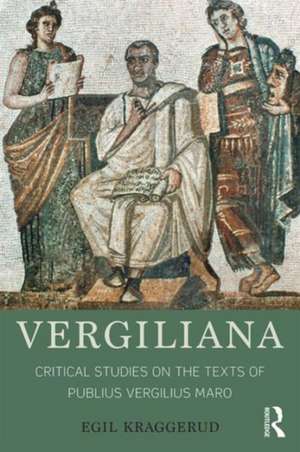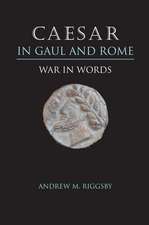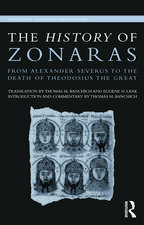Vergiliana: Critical Studies on the Texts of Publius Vergilius Maro
Autor Egil Kraggeruden Limba Engleză Hardback – 29 sep 2016
| Toate formatele și edițiile | Preț | Express |
|---|---|---|
| Paperback (1) | 389.38 lei 6-8 săpt. | |
| Taylor & Francis – 12 dec 2019 | 389.38 lei 6-8 săpt. | |
| Hardback (1) | 1170.74 lei 6-8 săpt. | |
| Taylor & Francis – 29 sep 2016 | 1170.74 lei 6-8 săpt. |
Preț: 1170.74 lei
Preț vechi: 1427.73 lei
-18% Nou
Puncte Express: 1756
Preț estimativ în valută:
224.09€ • 243.50$ • 188.36£
224.09€ • 243.50$ • 188.36£
Carte tipărită la comandă
Livrare economică 21 aprilie-05 mai
Preluare comenzi: 021 569.72.76
Specificații
ISBN-13: 9781138201347
ISBN-10: 1138201340
Pagini: 380
Dimensiuni: 156 x 234 x 26 mm
Greutate: 0.66 kg
Ediția:1
Editura: Taylor & Francis
Colecția Routledge
Locul publicării:Oxford, United Kingdom
ISBN-10: 1138201340
Pagini: 380
Dimensiuni: 156 x 234 x 26 mm
Greutate: 0.66 kg
Ediția:1
Editura: Taylor & Francis
Colecția Routledge
Locul publicării:Oxford, United Kingdom
Recenzii
"In this book Professor Kraggerud distils a lifetime’s learning and reflection on the textual criticism of Virgil. He discusses some hundred textual problems. Against those textual critics who insist on the received text he proposes conjectures, and argues for forty-four emendations on literary as well as palaeographical grounds. Scholars interested in the text of Virgil will want to own a copy and consider Professor Kraggerud’s suggestions."
- Fiachra Mac Góráin, University College London, UK
"This is a bold book, full of wisdom and critical sharpness, and deserves to be read carefully not only by editors and commentators, but by all serious students of Vergil."
- S. J. Heyworth, University of Oxford, UK, Bryn Mawr Classical Review, 2017
"It makes a valuable contribution to the reconstruction of several dozen passages in Vergil, as a result of which it will be obligatory reading for all future editors and commentators, and it can safely be recommended to anyone interested in these parts of the text."
- Daniel Kiss, Universitat de Barcelona & Eotvos Lorand Tudomanyegyetem, Exemplaria Classica, 2017
"The greatest merit of Kraggerud's work is to remind us that what we read in Virgil's editions is in no way a definitive text, but despite its relative stability there are still many points that are open to discussion and partly unresolved, but also possible hidden corruptions that may have escaped generations of readers and still require healing. For these reasons, as well as for the wealth and accuracy of the data made available, the present work will certainly have to be carefully considered by every future publisher of Virgil."
- Emanuele Berti, Rivista di Filologia e di Istruzione Classica 145, 2017
"Despite the uncertainty that will continue to characterize many of Virgil's textual problems, the importance of the critical commitment remains: even in cases where it provokes dissent, Kraggerud gives proof of an exemplary textual hermeneutic, which will certainly stimulate the coming years. critical exercise on Virgilian text."
- Fabio Stok, University of Rome Tor Veragata, Italy, Gnomon vol. 90, 2018
"This is a bold book, full of wisdom and critical sharpness, and deserves to be read carefully not only by editors and commentators, but by all serious students of Vergil."
- S. J. Heyworth, University of Oxford, UK, Bryn Mawr Classical Review, 2017
"It makes a valuable contribution to the reconstruction of several dozen passages in Vergil, as a result of which it will be obligatory reading for all future editors and commentators, and it can safely be recommended to anyone interested in these parts of the text."
- Daniel Kiss, Universitat de Barcelona & Eotvos Lorand Tudomanyegyetem, Exemplaria Classica, 2017
"The greatest merit of Kraggerud's work is to remind us that what we read in Virgil's editions is in no way a definitive text, but despite its relative stability there are still many points that are open to discussion and partly unresolved, but also possible hidden corruptions that may have escaped generations of readers and still require healing. For these reasons, as well as for the wealth and accuracy of the data made available, the present work will certainly have to be carefully considered by every future publisher of Virgil."
- Emanuele Berti, Rivista di Filologia e di Istruzione Classica 145, 2017
"Despite the uncertainty that will continue to characterize many of Virgil's textual problems, the importance of the critical commitment remains: even in cases where it provokes dissent, Kraggerud gives proof of an exemplary textual hermeneutic, which will certainly stimulate the coming years. critical exercise on Virgilian text."
- Fabio Stok, University of Rome Tor Veragata, Italy, Gnomon vol. 90, 2018
Cuprins
Introduction BucolicaEcl. 1. 69 post aliquot aristasA disputed phrase in its contextEcl. 2. 32 A god’s titlePan the great innovator and modelEcl. 3. 62 A conjunction at stakeTheocr. 5. 82 in the balanceEcl. 4. 8 One child initiating a new ageA letter added can make a big differenceEcl. 4. 28-9 Lines sharing words between themEmphasis achieved by artistryEcl. 4. 62-3 The nature of a baby’s smileA Dutch scholar vindicated Ecl. 5. 3 Why don’t we sit down? in LatinWhat Vergil chose to writeEcl. 5. 8 Indicative or subjunctive?In favour of PEcl. 5. 38 The gender of narcissusOur debt to an ancient grammarianEcl. 5. 66 Altars for DaphnisSorting out syntactical orderEcl. 6. 1-12. On the genesis of Vergil’s earliest poetryCall. Aet. 1. 21-4 and Theocr. 16 as inspirationEcl. 6. 16 Silenus’ hangoverThe troublesome adverbial ‘cluster’ procul tantum Ecl. 6. 24 The commonest of verbs ousted by a hapax?Peerlkamp’s brilliant pointEcl. 6. 34 A dilemma in PElided omnia in Vergil?Ecl. 6. 74-81 A praeteritio to fill the dayThe illustrative effect of complicated syntaxEcl. 7. 5 Equal and well-prepared singersA misleading first impression of their qualitiesEcl. 7. 29-32 Corydon’s promise to DianaVariation on
Descriere
In Vergiliana Egil Kraggerud collects together over 100 new, revised, and previously published discussions of textual issues in Vergil’s Eclogues, Georgics, and the Aeneid. Through these and in his Introduction, the author argues for a less conservative approach to these texts than has been fashionable among 20th century editors and commentators. This profoundly learned, engaging and valuable contribution is a critical resource for anyone working on the works of Vergil at both under- and postgraduate level, written by one of the most respected scholars in the field.












